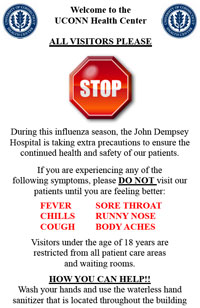Feature Story
Health Center Today, November 3, 2009
Flu Update - New Visitor Restrictions Implemented at Health Center Due to H1N1 Concerns
By Carolyn Pennington
The Health Center is restricting visitors who are under 18 years of age from all patient care areas and waiting rooms since they may be a candidate for carrying the H1N1 flu virus. Other precautions are being taken, including no more than four visitors per patient and no one with symptoms of an upper respiratory infection will be allowed in patient areas, according to Dr. Kevin Dieckhaus, head of the Infectious Diseases Division.
Dieckhaus also says direct patient care workers have been fitted with special N95 or PAPR (Powered Air Purifying Respirator) masks according to new Centers for Disease Control guidelines. These masks are not the same as loosely fitted surgical masks. They fit tightly around the mouth and nose and have filters that can block about 95 percent of the flu virus, according to recent findings by the Institute of Medicine.
“The Emergency Department has updated its surge capacity plans, and has implemented ‘flu bags,’ which provide patients with a small box of facial tissue, a small bottle of hand sanitizer, and a mask,” says Mark Petrone, environment of care coordinator in the Department of Facilities Management, who recently completed homeland security training at the Center for Domestic Preparedness in Anniston, Ala., a division of FEMA. The conference focused on pandemic influenza preparedness planning. “We’re also providing updates to the Connecticut Department of Public Health on a number of items such as patients being seen in the Emergency Department, personal protective equipment inventories, and vaccine and antiviral distribution. The past few months have been very busy and we’re anticipating it’ll continue throughout the winter months.”
The H1N1 and seasonal influenza vaccines are still in short supply and the Health Center is distributing them in a tiered manner. Patients at the highest risk of complications from influenza have been first to receive the vaccine. The first tier has also included our employees who are at highest risk of exposing our patients to influenza or being exposed to influenza by having direct patient contact. Infection prevention specialist Nancy Dupont says the Health Center is working to increase our vaccine supply but, if able, any employee who has the opportunity to receive their vaccine through non-Health Center resources should do so.
“We’re also hoping everyone does their part by following proper cough etiquette by coughing or sneezing into your sleeve or cover your mouth and nose with a tissue,” adds Dupont. “We urge everyone to wash their hands often and we have a lot of hand sanitizer available.”
Employees and patients should be considered infected with an influenza-like illness if they are experiencing symptoms which are similar to seasonal flu and include fever, cough, sore throat, runny or stuffy nose, body aches, headache, chills and fatigue. A significant number of people who have been infected with novel H1N1 flu virus also have reported diarrhea and vomiting.
Employees who are experiencing these symptoms should not report to work. The usual "call out" system should be used. The Health Center is following CDC guidelines which recommend that people with influenza-like illness remain at home until at least 24 hours after they are free of fever (100° F [37.8° C]), without the use of fever-reducing medications. Employees are asked to contact Employee Health Service at ext. 8005 before they return to work.
Additionally, there are tools on the UConn Health Center web site http://health.uchc.edu/healthresources/flu/index.htm offering employees, patients and visitors suggestions on how to stay healthy during the flu season and what to do if you should become ill with the flu.



